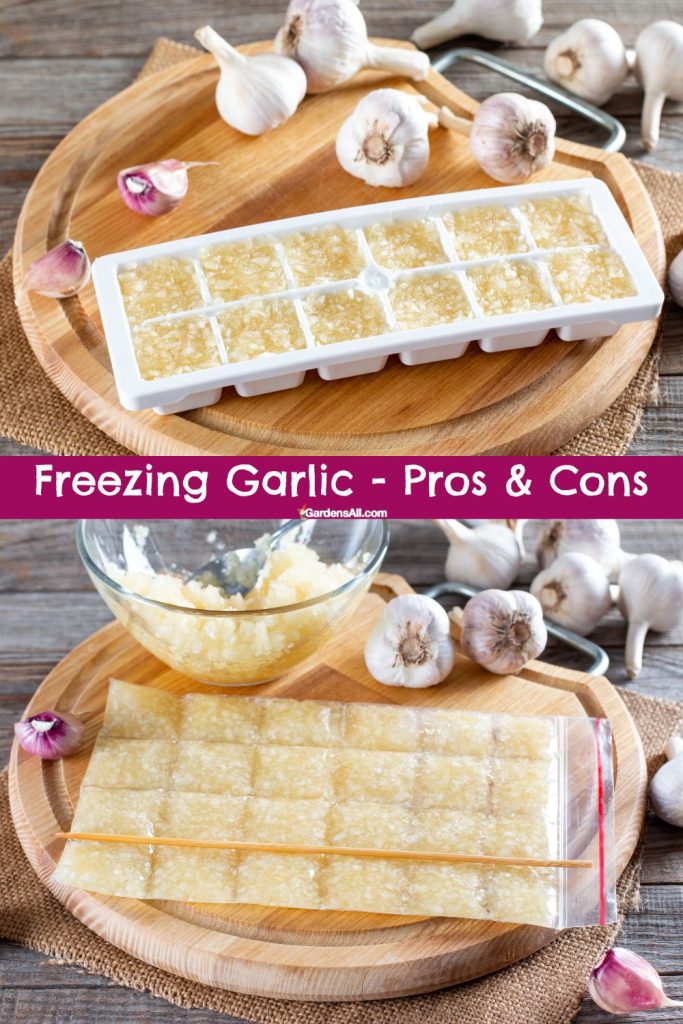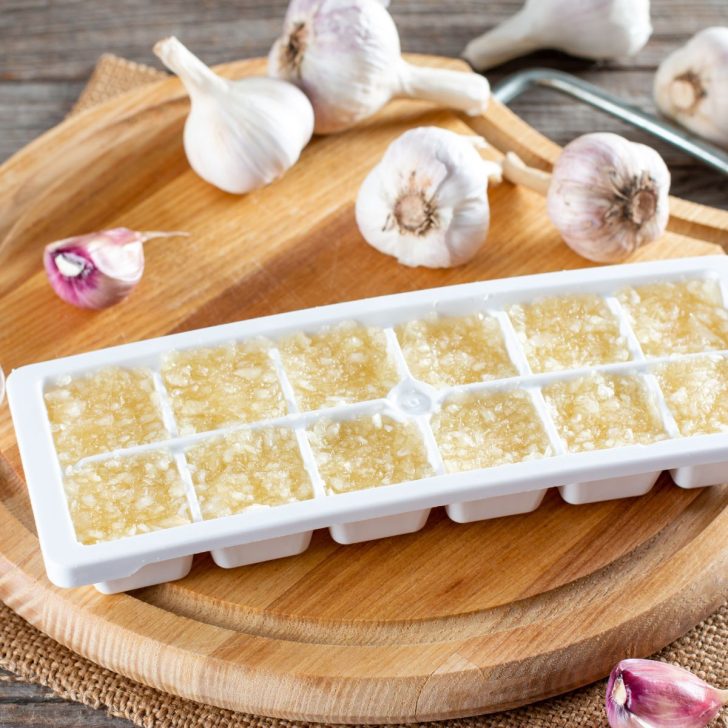So can you freeze garlic? Yes! Freezing garlic is a worthy option to consider for storing and preserving this favorite pungent herb-like vegetable, especially if you’re growing garlic.
Steps for Freezing Garlic
There’s no need to wash garlic before freezing because it has been in its protective skin. Beyond that, to freeze garlic while preserving its optimal nutrient content, taste, and texture, consider the following tips.
Prepping Garlic to Freeze
- Choose Fresh Garlic: Select fresh, high-quality garlic bulbs for freezing. Opt for bulbs that are plump, firm, and free from blemishes or damage.
- Curing: Any fresh garlic you buy from the store should already be cured. If you’re growing your own, you will need to cure them after harvesting, and before freezing. If you haven’t yet, see curing garlic.
- Peel & Separate : Remove the papery skin from the garlic head and separate the individual cloves. Removing the skin of each clove is optional, but we like to leave it as an added layer of protection between freezer odor and the garlic.
- Blanching (optional): If desired, blanch the prepared garlic cloves by briefly boiling them for 1-2 minutes. Immediately transfer the blanched garlic to an ice bath to halt the cooking process. One scientific study indicates blanching before freezing helps retain more of the garlic nutrients.[1]https://pubmed.ncbi.nlm.nih.gov/33295000/
- Drying: Thoroughly pat dry the blanched or unblanched garlic cloves using a clean kitchen towel or paper towels.
Methods of Freezing Garlic
Freezing garlic is a great way to preserve its freshness and flavor for an extended period. Here are a few different ways you can use to freeze garlic:
- Freezing Whole Garlic Cloves: Using zip bags, plastic containers or jars with lids. [See note below about using jars].
- Place the peeled or unpeeled garlic cloves in a freezer bag. We prefer several smaller bags zipper bags rather than one large one.
- Remove all air before sealing
- Date each bag so that it’s easy to see
- You may wish to bag all smaller bags into one larger one so that it’s easy to find and keep track of in the freezer.
- Freezing Garlic Paste: NOTE: See warnings below on the hazards of preserving garlic in oil.
- Peel and mince or crush the garlic cloves.
- Mix the minced garlic with oil, (we like olive oil) until a paste is formed.
WARNING: NEVER ALLOW THE GARLIC IN OIL TO REACH ROOM TEMPERATURE. - Freeze: Scoop the paste into an ice cube tray and freeze it. We like the handy sauce or soup freezer trays. But use whatever you have on hand, preferably in portions sized for use in recipes.
- Transfer the frozen cubes into a freezer bag or container for long-term storage. When cooking, just pop out a cube or two and add them straight to the pan, DO NOT DEFROST FIRST. [SEE BOTULISM WARNING BELOW].
- Freezing Roasted Garlic: If you enjoy the flavor of roasted garlic (our favorite!), you can roast whole heads of garlic, squeeze out the roasted cloves, then freeze them in a similar manner to the garlic paste method. Roasted garlic freezes very well and can be used in recipes that call for garlic.
Advantage to Using Jars for Freezing Garlic Cloves
Contributions from the Community
“We also grow and freeze garlic. I find that whole cloves in a glass jar works best for us as the glass keeps the strong smell out of the other food. I use fresh garlic when necessary, i.e. salads etc, but for cooking, frozen garlic is perfect. We grow a very pungent garlic, which I don’t find loses much flavour but does get a bit soft after being frozen.”
Suzan Miller
Reasons to and not to Freeze Garlic
There are pros and cons you may want to know about when it comes to freezing garlic.
The Pros to Freezing Garlic
- Convenience: Having frozen garlic on hand can save you prep time when cooking.
- Longevity: Garlic can start to sprout or rot if not used in time, so freezing extends its life.
- Prevents Waste: If you have a large harvest that needs preserving, freezing is better than wasting.
- Preserves Flavor: Freezing vegetables is known to help preserve the flavor and quality.
You can batch prep garlic to make it ready for dishes before freezing, which saves time for when you need quick and easier weekday meals.
Remember, frozen garlic may not be quite as good as fresh for some applications, such as raw in a salad, but it works well for use in cooking, such as soups, casserole and sauces.
The Cons to Freezing Garlic
- Texture & Composition: Freezing garlic can change its texture and body. Frozen garlic cloves tend to become softer and slightly mushy when thawed. While this may not be desirable in recipes calling for fresh raw garlic, for cooking, especially in soups and casseroles, the texture isn’t as noticeable.
- Less Flavor: Freezing can diminish the flavor of fresh garlic. Some people note that frozen garlic loses some of its pungency, resulting in a milder taste. However, this may just mean that you can use more garlic for recipes in which you’re using frozen garlic.
- Less Nutritional Potency: There’s a lot of mixed information out there on this to get into for our purposes here. But studies show that blanching before freezing helps preserve nutrients.[2]https://pubmed.ncbi.nlm.nih.gov/33295000/
Let’s face it. Just about the only thing that tastes better frozen is ice cream. But it can be the next best thing, and better a milder flavor is better than wasting garlic!
Can You Freeze the Whole Garlic Bulb?
While you can freeze the whole garlic bulb, it’s not generally not recommended because it’s easier to access the cloves you need if they’re separated from the head before freezing.
For Garlic Lovers…you may also enjoy some of our other garlic articles on Types of Garlic to Grow, Curing Garlic, Storing Garlic, and How to Make Black Garlic.

IMPORTANT: Never Preserve Your Garlic in Oil Without Freezing It
WARNING: Never preserve garlic in oil above freezing, without an acidic ingredient. It can develop Botulism.
Freezing garlic in oil drastically reduces the risk of botulism compared to storing it at room temperature or even refrigeration. This is because the botulism bacteria, Clostridium botulinum, doesn’t grow in temperatures below freezing. That said, it’s still important to follow safe food handling and storage practices to minimize any risk of foodborne illness.
Here are a few tips to ensure safety:
- Prepare with Clean Hands and Surfaces: Always ensure your hands, utensils, and work surfaces are clean before preparing any food to prevent the introduction of bacteria.
- Use Fresh Garlic: Use fresh garlic cloves that aren’t bruised or damaged, and make sure to peel them carefully to avoid introducing dirt or bacteria.
- Store Properly: Once you’ve mixed the garlic with oil, store it in a clean, airtight container, and freeze it immediately.
- Use within a Reasonable Timeframe: Even in the freezer, it’s best to use the garlic-oil mixture within several months. Over time, the flavor can deteriorate, and if there are any power outages or fluctuations in your freezer temperature, the safety of the mixture could be compromised.
IMPORTANT REMINDER: when using the frozen garlic-oil cubes, do not let them thaw out on the counter at room temperature. Thaw them in the refrigerator or add them directly to the dish you’re cooking to ensure they stay at a safe temperature.
Garlic in oil should be made fresh and stored in the refrigerator at 40 °F or lower for no more than 7 days. It may be frozen for several months.
REFERENCE: Research by the University of Georgia[3]https://ask.usda.gov/s/article/Can-you-get-botulism-from-garlic-in-oil#:~:text=Research%20performed%20by%20the%20University,no%20more%20than%207%20days.[4]https://www.cdc.gov/botulism/index.html
I’m LeAura Alderson, a garden, herb and plant enthusiast with a passion for discovering the many edible and medicinal benefits of the plants all around us, including the weeds! I’m a writer, editor and media publisher for our family of websites.
While I was certified in fitness and life coaching, I am NOT a health practitioner. However, I’m a lifelong health enthusiast, with a keen interest in healthy, organic foods and making home remedies and the content we share is from our own experience and usage as well as that extracted from scientific research so that you can explore further on your own.
Always seek the advice and guidance of your health practitioners first and foremost.
As a family we’re steadily expanding our gardening, experimentation and knowledge around all things gardening, edible landscaping, fresh organic foods and self sustainability with farming in our future. I also own and manage iCreateDaily.com, a site all about transformation through creation, and the power of positivity, optimism and mindset.
References

